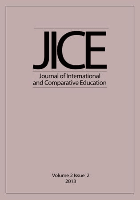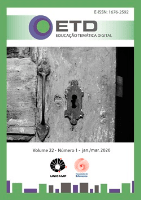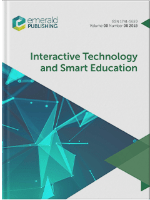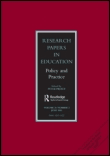
Education in the Knowledge Society
Scope & Guideline
Connecting ideas for a smarter, more inclusive education.
Introduction
Aims and Scopes
- Integration of Technology in Education:
The journal emphasizes the role of various technologies, including ICT, AI, and augmented reality, in enhancing educational experiences and outcomes. - Pedagogical Innovations:
It covers new pedagogical approaches, such as gamification, flipped classrooms, and digital social immersion, to improve student engagement and learning. - Equity and Inclusive Education:
The journal addresses issues of equity in education, focusing on how digital platforms and teaching methodologies can be inclusive for diverse learners. - Research on Educational Practices and Policies:
It includes empirical studies and systematic reviews that analyze educational practices, teacher training, and policy implications in contemporary education. - Impact of Social Contexts on Education:
The journal explores the influence of social factors, such as family perceptions and cultural contexts, on educational outcomes and methodologies.
Trending and Emerging
- Artificial Intelligence in Education:
There is a growing interest in the implications of AI technologies, such as ChatGPT, for educational practices, ethics, and student learning outcomes. - Digital Equity and Ethics:
Recent articles emphasize the importance of equity in education, particularly in how digital platforms serve diverse populations and the ethical considerations that arise. - Impact of the COVID-19 Pandemic:
Many studies focus on the changes in educational practices due to the pandemic, including remote learning, digital competencies, and student well-being. - Engagement through Interactive Learning:
Emerging themes include the use of gamification, collaborative learning environments, and innovative teaching tools that enhance student engagement and motivation. - Educational Research Methodologies:
There is a trend toward utilizing systematic reviews and mixed methods to evaluate educational practices, indicating a shift towards more rigorous and comprehensive research methodologies.
Declining or Waning
- Traditional Teaching Methods:
There has been a noticeable decline in research focusing on traditional teaching methods, as the journal increasingly emphasizes innovative and technology-driven approaches. - General Discourse on Educational Theories:
While foundational educational theories remain important, specific discussions on older, less adaptive theories have decreased, reflecting a shift toward practical applications and contemporary relevance. - Static Assessment Techniques:
Research on static or traditional assessment techniques is less prevalent, as the focus has moved toward dynamic and formative assessment methods that adapt to digital learning environments.
Similar Journals

Journal of International and Comparative Education
Bridging Cultures through Comparative InsightsJournal of International and Comparative Education, published by UNIV MALAYA PRESS, is a premier platform dedicated to the exploration of educational systems across diverse cultural contexts. With its commitment to Open Access since 2012, the journal ensures that vital research findings reach a global audience with no barriers, making it an essential resource for scholars, practitioners, and policymakers alike. The journal aims to facilitate discourse among international researchers by delving into comparative studies that inform educational practices and policy development. Based in Kuala Lumpur, Malaysia, this journal serves as a critical vehicle for enhancing the understanding of educational issues and trends worldwide, striving to impact both regional and global education landscapes.

Revista Educaonline
Innovating Pedagogy for the Digital AgeRevista Educaonline is a premier academic journal published by the Federal University of Rio de Janeiro's School of Communication, dedicated to advancing the field of online education and digital communication technologies. With the ISSN 1983-2664, this journal serves as an essential resource for researchers, educators, and practitioners exploring innovative methodologies and pedagogical frameworks in the digital landscape. Although the journal currently does not offer Open Access, it maintains a rigorous selection process to ensure the publication of high-quality research pertinent to contemporary educational practices. The editorial board is committed to promoting interdisciplinary discourse that bridges technology and education, fostering advancements that respond to the evolving needs of learners worldwide. As scholars strive to navigate the complexities of digital learning, Revista Educaonline stands out as a vital platform for disseminating impactful research, ultimately enriching the academic community's understanding of online education dynamics.

International Journal of Instruction
Illuminating the path to effective instructional strategies.International Journal of Instruction is a distinguished peer-reviewed journal dedicated to advancing the field of education through high-quality research and innovative instructional practices. Published by GATE Association for Teaching & Education in Switzerland, this open-access journal has been a beacon of knowledge since its inception in 2008, ensuring that impactful educational research is freely accessible to scholars, educators, and practitioners worldwide. With an impressive Q2 ranking in Education and a notable position in the 80th percentile within its category in Scopus, the journal showcases cutting-edge studies and discussions that reflect current trends and methodologies in teaching and learning. The scope of the journal includes a wide array of topics, ranging from instructional strategies to curriculum development, making it a vital resource for anyone engaged in the dynamic landscape of education. Explore the International Journal of Instruction today to contribute to and benefit from the collective wisdom of the global educational community.

ETD Educacao Tematica Digital
Exploring New Frontiers in Digital LearningETD Educacao Tematica Digital is a distinguished academic journal published by UNIV ESTADUAL CAMPINAS, FAC EDUCACAO, and has been at the forefront of educational research since its inception in 2004. With a focus on digital education and thematic approaches, this open access journal facilitates the dissemination of knowledge and innovative practices in the field of education, making it an invaluable resource for researchers, educators, and students alike. Its dedicated editorial board fosters discourse on the integration of technology within educational frameworks, ensuring the publication of high-quality articles that resonate with contemporary challenges and advancements in education. The journal’s commitment to accessibility and scholarly rigor positions it as a leading venue for those seeking to advance their understanding and application of digital pedagogies. With the ISSN 1676-2592, ETD aims to contribute significantly to the global discourse on educational methodologies and digital learning environments.

Interactive Technology and Smart Education
Exploring the synergy of technology and education for a smarter tomorrow.Interactive Technology and Smart Education is a leading academic journal published by EMERALD GROUP PUBLISHING LTD, dedicated to exploring the dynamic intersection of technology and education. With a robust impact factor signifying its significant contributions to the field, this journal consistently ranks in the Q1 quartile in categories such as Computer Science (Miscellaneous), Education, and E-learning, reflecting its prestige and wide-ranging influence. A staple for researchers, educators, and industry professionals, the journal addresses innovative practices and developments in interactive technologies that enhance teaching and learning experiences. Operating from its base in the United Kingdom, the journal spans nearly two decades of impactful publishing, featuring high-quality research that plays a crucial role in shaping the future of education through technology. Scholars seeking to stay at the forefront of this evolving field are encouraged to contribute and engage with the journal's pioneering work.

Asia Pacific Education Review
Transforming education through rigorous research and dialogue.Asia Pacific Education Review, published by SPRINGER, is a leading journal in the field of education, recognized for its rigorous scholarship and innovative contributions. With an ISSN of 1598-1037 and an E-ISSN of 1876-407X, the journal has established itself as a significant platform for research articles, reviews, and discussions focusing on educational practices and policies within the Asia Pacific region. As of 2023, it holds a commendable Q2 quartile ranking in education and is positioned in the top 83rd percentile of Scopus’ Social Sciences Education category. The journal aims to disseminate knowledge that fosters educational improvement and equity, making it an essential resource for researchers, educators, and policymakers alike. While Asia Pacific Education Review offers subscription-based access, it continues to attract a diverse readership from across the globe, including countries such as the Netherlands, where it is headquartered at VAN GODEWIJCKSTRAAT 30, 3311 GZ DORDRECHT. Engage with cutting-edge research that shapes the future of education in this vital region.

Technology Knowledge and Learning
Advancing the Intersection of Technology and EducationTechnology Knowledge and Learning, published by SPRINGER, stands as a pivotal platform in the realms of computational theory, computer science, education, and human-computer interaction. With an impressive impact factor reflecting its reputation, this journal has consistently ranked in the Q1 quartile across multiple categories as of 2023, including Computational Theory and Mathematics, Education, and Engineering. Spanning a timeline from 2011 to 2024, it serves as an essential resource for those engaged in exploring the intersections of technology, pedagogy, and knowledge transfer, thereby facilitating advancements in both theory and practical applications. Although it is not an open-access journal, the rigorous peer-review process ensures that only the highest quality research contributes to its esteemed reputation. By providing a platform for innovative research and discussions, Technology Knowledge and Learning plays a crucial role in shaping the future of technological education and applications, making it an invaluable resource for researchers, professionals, and students alike, seeking to stay at the forefront of this dynamic field.

International Journal of Education and Information Technologies
Exploring New Horizons in Educational TechnologyWelcome to the International Journal of Education and Information Technologies, a leading academic platform published by NORTH ATLANTIC UNIV UNION-NAUN. With an emphasis on the integration of education and information technology, this journal aims to foster innovative research and discussions that enhance pedagogical practices and technological advancements in educational contexts. Although currently an open access journal, it provides unrestricted access to emerging studies that are crucial for educators, researchers, and professionals aiming to stay at the forefront of education technology. While specific metrics such as H-index and Scopus ranks are yet to be defined, its ISSN 2074-1316 signifies its credibility and commitment to quality scholarship. This journal serves as a vital resource for those passionate about bridging the gap between technology and education, encouraging impactful research that shapes the future of learning environments.

Research Papers in Education
Advancing educational excellence through rigorous research.Research Papers in Education is a leading academic journal dedicated to advancing the field of education through the dissemination of high-quality research. Published by ROUTLEDGE JOURNALS, TAYLOR & FRANCIS LTD, this journal, with an ISSN of 0267-1522 and E-ISSN 1470-1146, has been pivotal in shaping educational discourse since its inception in 1986. The journal is recognized in the Q1 quartile for Education in the 2023 rankings and boasts an impressive 91st percentile in Scopus rankings. While it operates under a traditional subscription model, its reach is enhanced by its commitment to scholarly rigor, making it an indispensable resource for researchers, professionals, and students alike. Covering a diverse range of topics including pedagogical strategies, policy analysis, and educational technology, Research Papers in Education facilitates critical dialogue and innovation in the educational landscape, contributing significantly to the ongoing conversation around effective teaching and learning practices.

International Education Journal-Comparative Perspectives
Highlighting Diverse Educational Practices Worldwide.International Education Journal-Comparative Perspectives is a vital platform for the dissemination of research in the field of comparative and international education. Published by the Oceania Comparative & International Education Society in Australia, this journal has been contributing to academic discussions and scholarship since its inception in 1999. With ISSN 1443-1475 and E-ISSN 2202-493X, this journal covers a broad spectrum of topics relevant to education practitioners, researchers, and policymakers. Notably positioned in the Q4 quartile within its category and ranking 1247 out of 1543 in Scopus, it serves to highlight diverse educational practices across different contexts. Although it does not currently feature an open access model, the journal aims to promote knowledge exchange and enhance comparative educational research through its dedicated publications. As it continues to expand its reach until 2024, the International Education Journal-Comparative Perspectives remains an essential resource for those committed to understanding and improving education globally.